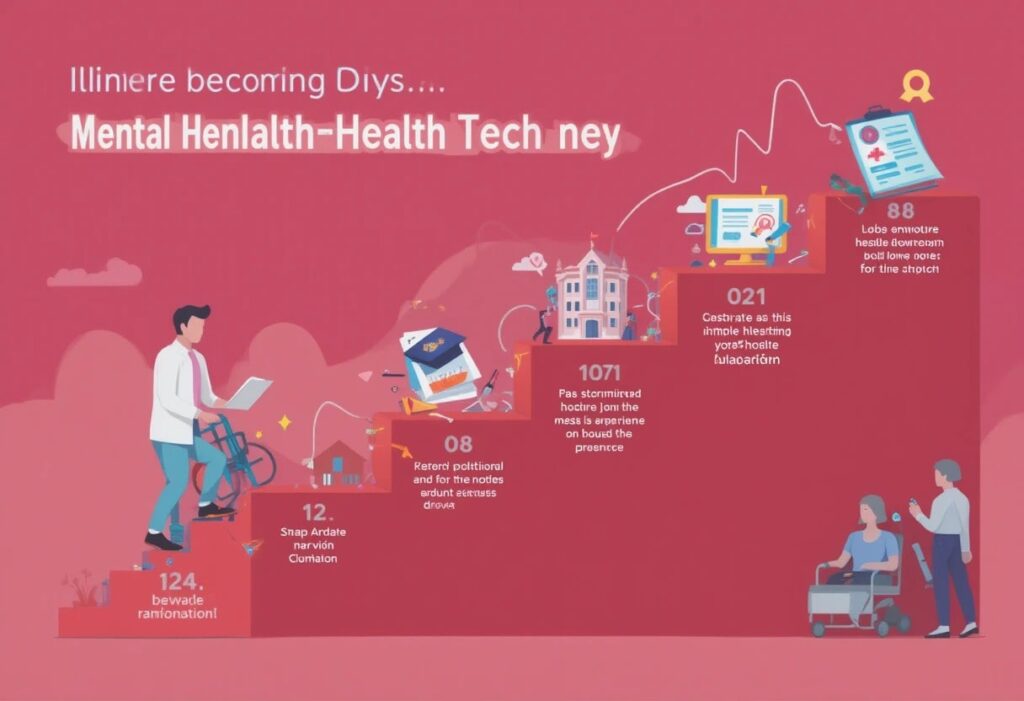Mental health technicians, also called behavioral health technicians, play a crucial role in supporting individuals with mental health conditions. They assist doctors, therapists, and other healthcare professionals by monitoring patients, helping with daily activities, and facilitating therapy sessions.
If you’re considering this career, it’s important to understand salary expectations, job responsibilities, and growth opportunities. Mental health awareness is increasing, leading to a growing demand for professionals in this field. This guide will provide a detailed breakdown of how much a mental health technician earns and what factors influence their pay.
What Is A Mental Health Technician?
Simply put, a mental health technician is someone who provides hands-on support to individuals struggling with mental health conditions. They help patients with daily tasks, monitor their behavior, and ensure their safety. They often work in hospitals, rehabilitation centers, and residential facilities, offering care and companionship.

Their responsibilities include assisting in therapy sessions, maintaining patient records, and providing emotional support to individuals undergoing treatment. Beyond that, they play a crucial role in helping patients feel heard, valued, and comfortable in their environment. Mental health techs make a real difference by creating a safe and supportive space for those in need.
Is Forta Health Legit?
When considering a company like Forta Health, it’s important to look at both positive and negative feedback. Forta Health provides parent-led ABA therapy using AI-based tools. While some parents and employees find the model helpful, others question its effectiveness. According to reviews, it has a mixed reputation, with some concerns about its approach to training parents as behavior technicians.
On one hand, Forta’s method aims to make therapy more accessible and convenient for families. However, some critics argue that parents may not receive enough professional training to deliver therapy effectively. At the same time, the company has changed its policies over time, including stopping payments to parents acting as RBTs. In the end, whether Forta Health is the right choice depends on individual needs and preferences.
How Much Does A Mental Health Tech Make?
Average Salary:
The average salary for a mental health technician in the U.S. ranges from $35,000 to $45,000 per year. Entry-level positions may start at $30,000, while experienced professionals can earn up to $50,000 or more.
Salary by State:
- California: $40,000 – $55,000
- Texas: $35,000 – $45,000
- New York: $38,000 – $52,000
Salary by Work Setting:
- Hospitals: $38,000 – $48,000
- Residential Care Facilities: $32,000 – $42,000
- Outpatient Clinics: $35,000 – $45,000
Salary by Experience:
- Entry-Level (0-2 years): $30,000 – $35,000
- Mid-Level (3-5 years): $35,000 – $45,000
- Experienced (5+ years): $45,000 – $55,000
Also read: Where Can I Use My Superior Health Plan Visa Card – Best Places Revealed!
Child Behavior Technician Salary:
When it comes to salary, Child Behavior Technicians in the U.S. typically earn between $18 to $25 per hour, depending on experience, location, and employer. At Forta Health, the pay is within a similar range, but benefits, workload, and job expectations may differ from other ABA therapy providers.
Forta Health Address:
Forta Health is headquartered in San Francisco, California, but its services are mostly remote and available across multiple states. Because of their virtual therapy model, they do not have many physical locations. For exact details, visiting their official website or contacting their support team is the best way to get updated information.
Parent-Led ABA Companies:
If you’re considering parent-led ABA therapy, Forta Health is one of the providers, but there are others as well. Some well-known companies include Elemy, Rethink Behavioral Health, and Sprout Therapy. These organizations focus on training parents to provide ABA therapy at home while offering professional guidance and remote support.
Forta Health CEO:
The CEO of Forta Health is Brian K. O’Kelley, who has played a key role in expanding the company’s vision. Under his leadership, Forta Health has raised $55 million to enhance its AI-powered, parent-led ABA therapy model. His goal is to make autism therapy more accessible and effective for families.
Factors That Affect Mental Health Tech Salaries:
Location:
When it comes to salary, where you work matters a lot. Cities with a high cost of living usually pay more because daily expenses are higher. For example, mental health techs in California or New York typically earn more than those in rural areas. Simply put, the demand and cost of living play a big role in pay differences.
Education & Certifications:
If you want to boost your salary, having the right education and certifications can help. While a high school diploma is enough for some jobs, earning a degree in psychology or social work can open more doors. On top of that, certifications like CBHT or RBT can make you stand out and increase your earning potential.
Work Setting:
Believe it or not, where you work can make a big difference in your paycheck. Hospitals and private clinics usually pay more than residential care facilities or non-profits. That’s because these settings often have more funding and require additional skills. If you’re looking for a higher salary, choosing the right workplace can make all the difference.
Experience:
The more you learn, the more you can earn. Entry-level mental health techs usually start with a lower salary, but as they gain experience, their pay increases. Over time, those with five or more years in the field can move into leadership roles with higher salaries. In short, experience leads to better opportunities and better pay.
Forta Aba Lawsuit:
As of now, there are no widely reported lawsuits against Forta Health. However, their parent-led ABA model has sparked debates within the industry. One major concern was their previous practice of paying parents to become Registered Behavior Technicians (RBTs) for their children.
Recently, Forta Health announced that they would no longer compensate parents for providing therapy to their children. This decision followed discussions about potential ethical concerns, insurance regulations, and the quality of care provided under this model. While some people support the approach, others believe that trained professionals should always be the primary providers of ABA therapy.
How To Become A Mental Health Technician?

Education:
To begin your journey, you’ll need at least a high school diploma or GED. While this is the minimum requirement, earning an associate’s or bachelor’s degree in psychology or social work can give you an advantage. Simply put, higher education can lead to better job opportunities, higher pay, and more career flexibility in the future.
Certifications:
If you want to stand out, getting a professional certification can make a big difference. Certifications like Certified Behavioral Health Technician (CBHT) or Registered Behavior Technician (RBT) prove that you have the right skills. Not only that but having certification may also increase your chances of getting hired and earning a higher salary.
Experience:
When it comes to working in mental health, hands-on experience is extremely valuable. Volunteering at mental health centers or taking on internships can help you develop essential skills. More importantly, real-world experience shows employers that you are passionate about helping people and ready to take on the challenges of the job.
Job Search:
Once you’ve gained the necessary skills, it’s time to start applying for jobs. Look for openings in hospitals, mental health clinics, and rehabilitation centers. Keep in mind that networking can also help—connecting with professionals in the field may lead to better job opportunities. At the end of the day, persistence and patience are key to landing a great job.
Career Growth:
Your journey doesn’t stop here. As you gain experience, you can specialize in different areas, earn advanced certifications, or even pursue further education. Over time, this can lead to leadership roles, better pay, and greater career satisfaction. In short, growing in this field opens the door to exciting new opportunities.
Future Outlook For Mental Health Techs:
Looking ahead, the demand for mental health technicians is expected to grow as mental health awareness increases. More people are seeking professional help, leading to job opportunities in hospitals, outpatient clinics, and rehabilitation centers. This means mental health techs will continue to play a vital role in patient care.
On top of that, government and private healthcare organizations are investing more in mental health services, creating a need for trained professionals. With this growth, salaries may also improve, making it an even more attractive career. In short, becoming a mental health tech offers job stability, career advancement, and the opportunity to make a real difference in people’s lives.
FAQS:
Is Forta Health a legitimate company?
Yes, Forta Health is a legitimate company that provides parent-led ABA therapy using AI-based tools. While some parents and employees find the model helpful, others question its effectiveness. It has received mixed reviews, with concerns about training quality and whether parents should act as behavior technicians.
Does Forta Health have any lawsuits?
Currently, there are no widely reported lawsuits against Forta Health. However, the company’s parent-led ABA model has raised ethical and insurance-related concerns. Due to this, Forta recently stopped paying parents to act as Registered Behavior Technicians (RBTs) for their own children.
How much does a Child Behavior Technician make?
In the U.S., Child Behavior Technicians typically earn between $18 to $25 per hour. Salaries vary based on experience, location, and employer. At Forta Health, the pay falls within this range, but benefits, workload, and job expectations may differ from other ABA therapy providers.
What is Forta Health’s approach to ABA therapy?
Forta Health focuses on a parent-led ABA therapy model, where parents are trained to implement therapy with their children. This approach aims to improve therapy access, but some critics argue that parents may not receive enough professional training to replace traditional behavior technicians.
Is Forta Health available nationwide?
Forta Health is based in San Francisco, California, but offers remote ABA therapy services across multiple states. Because of their virtual model, they do not have many physical locations. For exact availability, visiting their official website or contacting customer support is recommended.
Conclusion:
When it comes to mental health care, technicians and behavior specialists play a crucial role in supporting individuals with mental health needs. As awareness grows, the demand for trained professionals continues to rise, creating stable job opportunities. Whether considering Forta Health or other providers, choosing the right path depends on individual goals and career preferences.
At the same time, it’s important to research different employers, salary expectations, and career growth opportunities before making a decision. The good news is that mental health careers offer meaningful work and long-term stability. In the end, finding a role that aligns with your passion and skills will lead to a fulfilling career.











